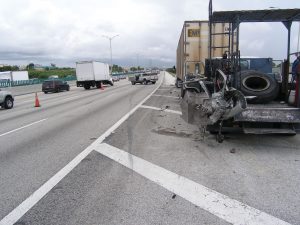 We recently resolved a case involving a reimbursement dispute under an Occupational Health & Disability Insurance Policy. Our client, an independent trucker, had sustained catastrophic injuries from being struck by a motor vehicle as he was changing a tire while parked in a gore on I-95 in Florida. He was hospitalized in intensive care and was unable to return to work for nearly two years. Thankfully, he was covered under the insurance policy, which paid his medical bills and lost wages.
We recently resolved a case involving a reimbursement dispute under an Occupational Health & Disability Insurance Policy. Our client, an independent trucker, had sustained catastrophic injuries from being struck by a motor vehicle as he was changing a tire while parked in a gore on I-95 in Florida. He was hospitalized in intensive care and was unable to return to work for nearly two years. Thankfully, he was covered under the insurance policy, which paid his medical bills and lost wages.
The insurance policy contained language entitling the carrier to be reimbursed in full from any money our client was paid as a result of the accident.
We sued two individuals and a company seeking damage compensation for our client. After litigating the case for more than three years, we secured a reasonable settlement. We held the money in trust pending resolution of the Occupational Health & Disability Insurance carrier’s reimbursement claim. Unable to work out the claim amicably, we filed a petition to resolve the claim with the court that handled the underlying personal injury case. (Anticipating problems in resolving the reimbursement claim amicably, we asked the court to retain jurisdiction for that eventuality. Doing so allowed us to keep a smart judge and avoid a new filing fee.)
The policy contained the following language: “The Policy is governed by the laws of the jurisdiction in which it is delivered.”
The insurance carrier was home based in another state and the policy was made available to large companies throughout the United States who used independent drivers like our client, through a trust company based in Washington, DC. The carrier argued that Washington, DC law applied to the reimbursement claim since the policy was delivered to the trust in DC. Under DC law, the terms of the policy would control. This would effectively enable the carrier to recover 100% of the underlying settlement without our client netting anything. (The underlying case had exceedingly difficult liability issues. The most at-fault person, who was intoxicated, had no insurance and died penniless before we got the case. We ended up suing a separate company, which was responsible for highway assistance, for failing to have proper warning lights on its vehicle. We received a sizeable settlement, but the amount paid by the OH&D carrier was more sizeable.)
We argued that Florida law, in particular, Florida Statute 768.76(4), applied to the reimbursement dispute. Under this statute, the court would be allowed to reduce the reimbursement amount owed by taking various equitable factors into consideration including procurement costs and comparing the settlement amount to the full value of the case. See Jeffrey P. Gale, P.A. // Resolving Health and Disability Insurance Liens in Personal Injury Cases Under Florida Statute 768.76.
Continue reading
 Companies make billions of dollars leasing and renting their motor vehicles. You’d think they’d have some corresponding corporate responsibility to compensate individuals injured through no fault of their own by the negligent operation of their vehicles. They don’t.
Companies make billions of dollars leasing and renting their motor vehicles. You’d think they’d have some corresponding corporate responsibility to compensate individuals injured through no fault of their own by the negligent operation of their vehicles. They don’t. Florida Injury Attorney Blawg
Florida Injury Attorney Blawg










